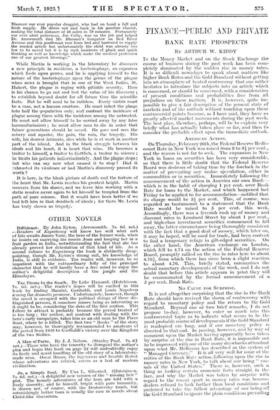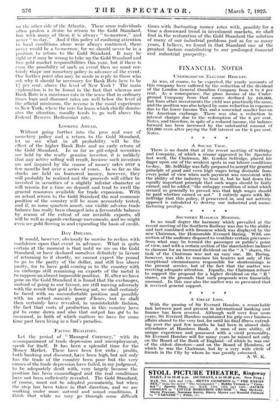FINANCE-PUBLIC AND PRIVATE
BANK RATE PROSPECTS
BY ARTHUR W. KIDDY IN the Money Market and on the Stock Exchange the -course of business during the past :week has been -com- pletely dominated by the sudden _rise in money rates. It is so difficult nowadays to speak about matters like higher Bank Rates and the Gold Standard without getting into an atmosphere of heated controversy that one rather hesitates to -introduce the subjects into an article which is concerned, or should be concerned, with a consideration of .present conditions and probabilities free from all prejudices on these matters. It is, however, quite im- possible to give a fair description of the present state of markets and of the outlook without touching upon these controversial points because, as I have said, they have so greatly affected market movements during the past week. The best plan, therefore, perhaps, will be to explain very briefly what has actually taken place so .far, and then to 'consider the probable effect upon the immediate outlook.
AMERICAN ACTION.
On Thursday, February 26th, the Federal Reserve Redis- count -Rate -in New York was raised from 3 to 34- per cent., and -the reason is -not far to seek. The expansion -in Now York in loans on securities has been very considerable, so that there is little doubt that the Federal Reserve Board was desirous of taking time :by .the -forelock in the _matter of preventing any undue speculation, either -in -commodities or in securities. Immediately following the -announcement of the action in America our own Bank—. which -is in the habit -of 'charging 1 per cent. over Bank Rate for loans to the Market, and which happened last Friday -to be applied to for accommodation—notified that its charge -would be 51- per cent. This, of course, was regarded as tantamount -to a statement that the Bank Rate would be -raised to 5 per cent. this week. Accordingly, there was -a feverish rush up of money and -discount rates in Lombard -Street by about 1 per cent., and high-class investment securities -commenced to fall away, the latter circumstance being thoroughly consistent with the fact that a good deal of money, which later on, it may .be hoped, will be .used for trade, -had been content to find a temporary refuge in gilt-edged securities. On the other hand, the American exchange on London, which fell to 4.74 on the action of the Federal Reserve Board, promptly rallied on the rise in rates here to about 4.761, from which there has since been a slight reaction to about -4.76. This, briefly stated, summarizes the actual monetary developments of the week, and I do not doubt that before this article appears in print they will -be consummated by the formal announcement of a 5 per cent. Bank Rate.
No -CAUSE FOR SURPRISE.
It is not altogether surprising that the rise in the Bank Rate should have revived the storm of controversy with -regard to monetary policy and the return to the Gold Standard. Beyond one or two brief remarks, I do not propose to-day, however, to enter -so much into this controversial topic as to indicate what seems to be the most probable course of developments if the Gold Standard is readopted ere long, and if our monetary policy is directed to that end. In passing, however, and by way of comnient upon the Market having apparently been taken by _surprise at the rise in Bank Rate, it is -impossible not -to be -impressed with one of the many drawbacks attendant upon -what Mr. McKenna has described as the system of " Managed Currency." It is all very well for some of the critics of the Bank Rate action, following upon the rise in money rates in New York, to talk about our being " vas- -sals -of -the United States." There is, however, such a thing -as looking certain economic facts straight in the face, .and why the Market was taken by surprise with regard to the recent spurt in money rates was because dealers refused to -look farther than local conditions and preferred to take the fullest advantage of our being off the Gold Standard to ignore the plain conditions prevailing on the other side of the Atlantic. These same individuals often profess a desire to return to the Gold Standard, but with many of them it is always " to-morrow," and never " to-day." And if this policy of confining attention to local conditions alone were always continued, there never would be a to-morrow, for we should never be in a position to return to the Gold Standard. It may be right or it may be wrong to take up the Gold Standard and free gold market responsibilities this year, but if there is even the possibility of such an event then we must cer- tainly shape our monetary policy in advance of the event. One further point also may be made in reply to those who ask why it should be necessary for Bank Rate here to be 11 per cent. above the level of New York ? The main explanation is to be found in the fact that whereas our Bank Rate is a maximum rate in the sense that in ordinary times loan and discount rates are well below the level of the official minimum, the reverse is the usual experience in New York, where the rate for loans which chiefly domin- ates the situation, usually tends to go well above the Federal Reserve Rediscount rate.
LOOKING AHEAD.
Without going further into the pros and cons of monetary policy and a return to the Gold Standard, let us see what in all probability will be the effect of the higher Bank Rate and an early return of the Gold Standard. In so far as gilt-edged securities are held by the really genuine investor, it is unlikely that any active selling will result, because such investors are not inspired by the course of money rates over a few months but over a series of years. In so far as the stocks arc held on borrowed money, however, they will probably be realized and the proceeds will either be invested in securities of a slightly inferior character or will remain for a time on deposit and tend to swell the general resources available for trade expansion. With an actual return to the Gold Standard the real economic position of the country will be more accurately tested, and if, as some quarters assert, our visible adverse trade balance has really been changed into a favourable balance by reason of the extent of our invisible exports, all will be well as regards exchange movements, and we might even see gold flowing in and expanding the basis of credit.
DAY DREAMS.
It would, however, obviously be unwise to reckon with confidence upon that event in advance. What is quite certain at the moment is that until we are on the Gold Standard, or have declared ourselves definitely in favour of returning to it shortly, we cannot expect the pound to go to the parity of the dollar, and still less above parity, for to have gold coming in to the country with an embargo still remaining on exports of the metal is to suppose an almost impossible position. If, after we have gone on the Gold Standard it is found that the exchanges, instead of going in our favour, are still moving adversely with the result that gold is flowing out, we shall certainly be faced with an uncomfortable position and possibly with an actual mauvais quart d'heure, but we shall then certainly have revealed, in unmistakable fashion, the fact that costs of production in this country have got to come down and also that output has got to be increased, in both of which matters we have for some time past been living in a fool's paradise.
FACING REALITIES.
Let the period of " Managed Currency," with its accompaniment of trade depression and unemployment, speak for itself. It has been a splendid time for the Money Market. There have been few risks ; profits, both banking and discount, have been high, but not only has the trade of the country been poor but the very causes of the trade depression have failed, in my judgment, to be adequately dealt with, very largely because the position has been camouflaged and the real conditions have not been sufficiently "revealed. The Gold Standard, of course, must not be adopted prematurely, but when the step has been taken. in that direction, and we arc working under more natural and sound conditions, I think that while we may go through some difficult times with fluctuating money rates with, possibly for a . time a downward trend in investment markets, we shall find in the restoration of the Gold Standard the solution of many of our industrial problems just as for so many years, I believe, we found in that Standard one of the greatest factors contributing to our prolonged financial and industrial prosperity.



























































 Previous page
Previous page